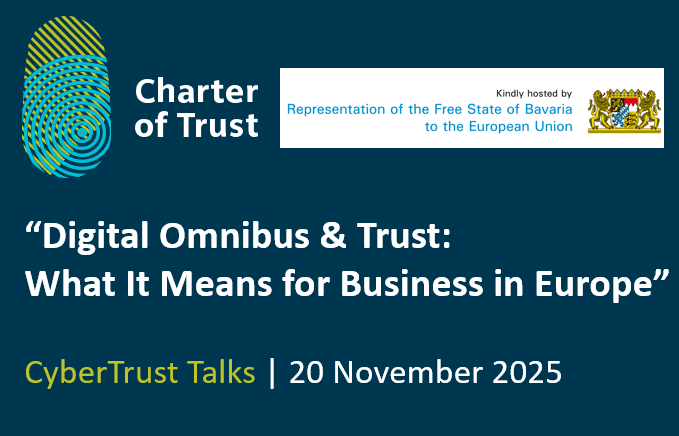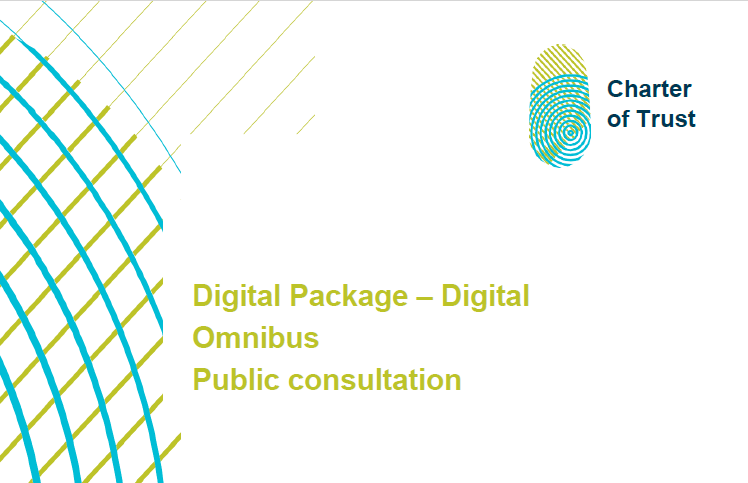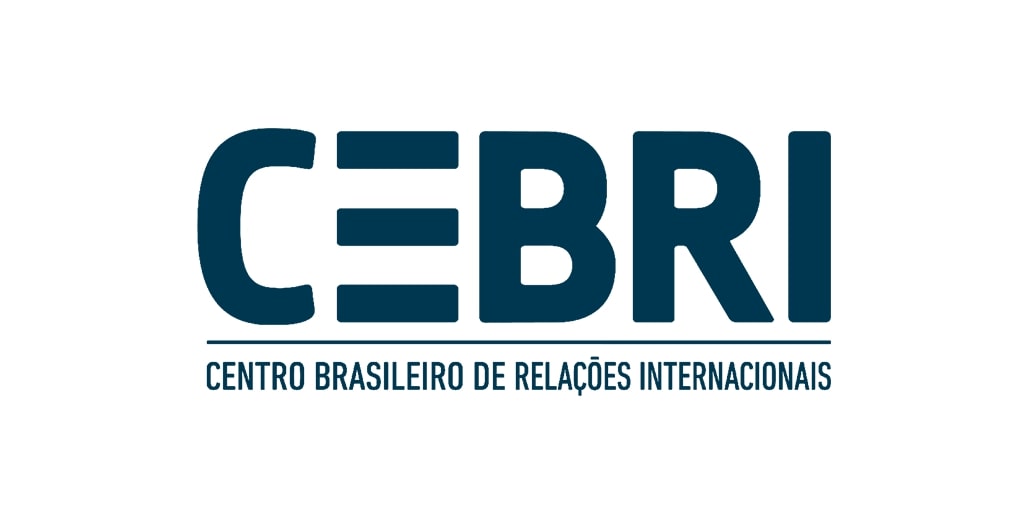

Activities
Supply Chain Security
Ensure resilient supply chains from cyber threats.
Objectives
Our mission is to draw from our Partners’ common experience and expertise to develop best practices on effectively ensuring the resilience of our respective supply chains against cyber threats.
We provide actionable guidelines to help businesses fortify their supply chain security. By fostering collaboration among industry leaders, policymakers, and the broader community, we aim to create a robust security framework that mitigates risks and enhances the overall integrity of the supply chain.
Through our collective efforts, we strive to build a secure and resilient digital supply chain that supports the continuity and trust of our industries.

Our latest activities
Latest news, publications, events
What we have been up to

3rd CyberTrust Talk - Digital Omnibus & Trust - What it Means for Business in Europe?
Join us for a timely and dynamic edition focused on “Digital Omnibus & Trust: What It Means for Business in Europe” kindly hosted by the Representation of the Free State of Bavaria to the EU on November 20, 2025 at 11:00 AM (Central European Time) for a lunch event filled with insightful discussions on cybersecurity and trust in the digital age.
With the European Commission unveiling its landmark Digital Omnibus Package just one day before, this event is your exclusive opportunity to be among the first to explore its real-world impact on business and the digital economy across Europe.
What to Expect:
Opening remarks by:
Dr. Armin Hartmuth, Director, Representation of the Free State of Bavaria to the European Union
Dr. Sumit Chanda, COO, Atos Group Security & Business Lines CISO, and Co-Chair of the Charter of Trust.
Keynote Address:
Despina Spanou, Deputy Director General for Cybersecurity and Trust, European Commission (DG CNECT), will share first-hand insights into the objectives and expected impact of the Digital Omnibus Package.
Expert Panel Discussion featuring:Moderated by Sudhir Ethiraj, Global Head of Cybersecurity Office, CEO Business Unit Cybersecurity Services, TÜV SÜD.
Despina Spanou, Deputy Director General for Cybersecurity and Trust, European Commission (DG CNECT)
Kia Slæbæk Jensen, Cyber Advisor, Permanent Representation of Denmark to the EU
Suzanne Button, Field CTO EMEA, Elastic
Tomas Jakimavicius, Director European Government Affairs, Microsoft
Yana Humen, AI and Cybersecurity Policy Manager, Government and Regulatory Affairs, IBM
Interactive Q&A: Bring your questions and join the conversation on regulatory coherence, innovation, and the future of digital governance in Europe.
Closing remarks by Maria del Pino Gonzalez-Junco, Director of the Charter of Trust
Networking Lunch: Connect with peers, policymakers, and industry leaders in an informal setting.
Why attend?
Gain first-hand insights into the EU’s Digital Omnibus Package—straight from the policymakers and experts shaping it.
Understand the immediate implications for your business and how to navigate upcoming changes.
Be part of a strategic dialogue that could influence the future of digital regulation in Europe.
With the European Commission unveiling its landmark Digital Omnibus Package just one day before, this event is your exclusive opportunity to be among the first to explore its real-world impact on business and the digital economy across Europe.
What to Expect:
Opening remarks by:
Dr. Armin Hartmuth, Director, Representation of the Free State of Bavaria to the European Union
Dr. Sumit Chanda, COO, Atos Group Security & Business Lines CISO, and Co-Chair of the Charter of Trust.
Keynote Address:
Despina Spanou, Deputy Director General for Cybersecurity and Trust, European Commission (DG CNECT), will share first-hand insights into the objectives and expected impact of the Digital Omnibus Package.
Expert Panel Discussion featuring:Moderated by Sudhir Ethiraj, Global Head of Cybersecurity Office, CEO Business Unit Cybersecurity Services, TÜV SÜD.
Despina Spanou, Deputy Director General for Cybersecurity and Trust, European Commission (DG CNECT)
Kia Slæbæk Jensen, Cyber Advisor, Permanent Representation of Denmark to the EU
Suzanne Button, Field CTO EMEA, Elastic
Tomas Jakimavicius, Director European Government Affairs, Microsoft
Yana Humen, AI and Cybersecurity Policy Manager, Government and Regulatory Affairs, IBM
Interactive Q&A: Bring your questions and join the conversation on regulatory coherence, innovation, and the future of digital governance in Europe.
Closing remarks by Maria del Pino Gonzalez-Junco, Director of the Charter of Trust
Networking Lunch: Connect with peers, policymakers, and industry leaders in an informal setting.
Why attend?
Gain first-hand insights into the EU’s Digital Omnibus Package—straight from the policymakers and experts shaping it.
Understand the immediate implications for your business and how to navigate upcoming changes.
Be part of a strategic dialogue that could influence the future of digital regulation in Europe.
Read more
November 5, 2025

Read the Charter's contribution to the European Commission's public consultation on the Digital Omnibus Package
The rapid expansion of EU digital regulation has strengthened security, privacy, and trust, but it has also created overlapping obligations, inconsistent timelines, and administrative complexity. The Digital Omnibus Package provides a timely opportunity to streamline these rules, ensure greater coherence, and enable businesses to focus resources on resilience and innovation rather than redundant compliance tasks.
The Charter of Trust welcomes the Commission’s initiative to harmonize digital regulations across the EU, aiming to reduce administrative burdens while maintaining high standards of security and privacy. Representing the unified views of its Partners, this paper addresses all key legislation within the scope of the Digital Omnibus and offers comprehensive recommendations. It emphasizes the need for a unified incident reporting system, risk-based notification requirements, and fair compliance processes to minimize regulatory overlap. The Charter calls for clearer liability clauses, global recognition of certifications, and stronger supply chain security.
In data regulation, the Charter advocates ensuring alignment between the rules on data intermediation services under the DGA and B2B data sharing under the Data Act and extending exemptions to mid-cap companies, all while safeguarding trade secrets. For artificial intelligence, the paper recommends a phased approach to new requirements, integrated conformity assessments, harmonized compliance templates, and clear definitions, supported by sector-specific guidance and transparent AI categorization. The Charter also encourages the European Commission to ensure that ePrivacy reform is future-proof, fosters innovation, and reflects the needs of both businesses and consumers. Finally, it recommends robust security standards and cross-border recognition for the EU Business Wallet, with industry involvement in technical standards and integration with data access systems.
Collectively, these measures are designed to foster innovation, resilience, and trust in the EU’s digital landscape, allowing businesses to thrive in a coherent and future-ready regulatory environment.
The Charter of Trust welcomes the Commission’s initiative to harmonize digital regulations across the EU, aiming to reduce administrative burdens while maintaining high standards of security and privacy. Representing the unified views of its Partners, this paper addresses all key legislation within the scope of the Digital Omnibus and offers comprehensive recommendations. It emphasizes the need for a unified incident reporting system, risk-based notification requirements, and fair compliance processes to minimize regulatory overlap. The Charter calls for clearer liability clauses, global recognition of certifications, and stronger supply chain security.
In data regulation, the Charter advocates ensuring alignment between the rules on data intermediation services under the DGA and B2B data sharing under the Data Act and extending exemptions to mid-cap companies, all while safeguarding trade secrets. For artificial intelligence, the paper recommends a phased approach to new requirements, integrated conformity assessments, harmonized compliance templates, and clear definitions, supported by sector-specific guidance and transparent AI categorization. The Charter also encourages the European Commission to ensure that ePrivacy reform is future-proof, fosters innovation, and reflects the needs of both businesses and consumers. Finally, it recommends robust security standards and cross-border recognition for the EU Business Wallet, with industry involvement in technical standards and integration with data access systems.
Collectively, these measures are designed to foster innovation, resilience, and trust in the EU’s digital landscape, allowing businesses to thrive in a coherent and future-ready regulatory environment.
Read more
October 20, 2025

Enhancing international cooperation, data governance and public-private partnership to protect critical infrastructures against cyber threats
By the Brazilian Center for International Relations (CEBRI), Associated Partner of the Charter of Trust.
Read more
September 29, 2022



